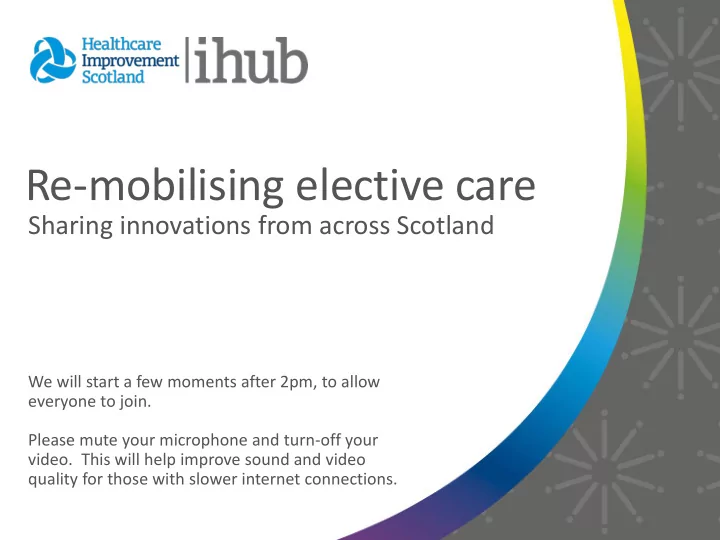

Re-mobilising elective care Sharing innovations from across Scotland We will start a few moments after 2pm, to allow everyone to join. Please mute your microphone and turn-off your video. This will help improve sound and video quality for those with slower internet connections.
Re-mobilising elective care Sharing innovations from across Scotland Thomas Monaghan National Programme Director for Access QI Healthcare Improvement Scotland
Access QI We support NHS boards use their quality improvement expertise to improve waiting times.
Access learning system Managing the physical environment Maximising service capacity and capability Enabling digital access Maintaining staff safety and wellbeing
Agenda
NHS Tayside Re-mobilising Elective Care Apr – Aug 2020 Paul Arbuckle Service Improvement Lead NHS Tayside
A new normal is emerging • We will be delivering services with COVID for at least the next 12- 18months There will be a long-term requirement of separate our streams into low risk COVID and high risk COIVD • Whilst there is sustained community transmission there will be constraints of enhanced PPE for our treatments. • We will need to maintain a minimum COVID-19 configuration (e.g. twice baseline ICU capacity). • We will need to ensure a system-wide solution involving acute, primary, social and community care. • We will have to develop a new normal.
Objective: Adapt to ensure that our health and social care services resume wider care as soon as possible, safe for patients and safe for staff
Elective planning (and adaptation) has already started! • Increase in digital capacity (Telephony/Remote connections) • Enhanced Vetting • Increase in remote consultations both telephone/near me. • Ambulatory care • and much more….
Structured approach • Understand what has happened across all areas • Testing with Gynae/Derm/Colorectal • Combining Operational planning/QI/Design • Collaboration…. – HBI – QI – Capacity managers (DCAQ) – Finance – Work in partnership primary/secondary care
Key principles • Patients should only attend hospital if there is no other alternative • Plans should reflect the 6 principles of Realistic Medicine • Plan should maximise the use of available resources to deliver clinically prioritised care to as much of the population as possible • Plan must be flexible to accommodate waves of COVID-19 • Develop plans in partnership with our primary care and health and social care partners
Timeline Actions Prepared for surge of COVID-19 Remodelled acute bed/theatre and ICU provision Mobilised/Redeployed and up skilled our workforce Stepped back routine work to focus on COVID/USC Urgent work. Core Services Adaptation Innovation
Evolution of Mobilisation support Support Assurance Planning Template to specialties 1 st Remobilise, recover, Planning Template redesign plan returned to SG end May Specialties need support with problems they can’t solve on their own Planned Care Board meets for first time Mid-June Work Plan and support group Mobilisation 2nd Meetings Remobilise, recover, redesign plan Timescales! All to SG end July specialties – Mar21 Get help to create a Learning System Remobilisation Review
Structure of (this version of) Toolkit Timeline to remobilise, recover and redesign routine care; safe for patients, safe for staff MILESTONE 1 KEY OUTCOMES MILESTONE 2 KEY OUTCOMES MILESTONE 3 KEY OUTCOMES Establish specialty remobilisation team 1. Remobilise 2. Remobilise & Recover 3. Recover & Redesign 4. Redesign Agree pathway(s) being remobilised, identify and Review improvements and Refine your understanding Build on reliability and act on immediate continuously improve and stabilise redesign constraints, connect with flow, safety and capacity others who can help
Insights Planned Care Support Group • Multidisciplinary Change Core team • Secondary Care Clinician • Primary Care clinician • Improvement • Convening, sense-making, framing • TrakCare BAU • Health Records • eHealth • Having the mirror held up to us • Capacity Planning • H&BI • Finance • Go back vs never go back Support may be drawn from: • Infection Prevention & Control • Hold plans lightly – just enough structure • Diagnostics • AHP • Estates • Gets bumpy but stay in the conversation • Workforce • Transport • RefGuide • • Staffside New territory, no “route map”, but everyone motivated to do their best - within their skill set Clinical Teams • Teamwork teamwork teamwork System Leaders • MS Teams Virtual Backgrounds
Local Innovations Sharing innovations to aid re-mobilisation of elective care services Colette Dryden Improvement Advisor Healthcare Improvement Scotland
Sharing Innovations Managing the physical environment Maximising service capacity and capability Enabling digital access Maintaining staff safety and wellbeing
Share your local innovations Do you have an innovation you would like to share? We would love to hear from you. Please complete the template in the chat box and return to hcis.access-qi@nhs.net Camilla Somers Knowledge and Information Skills Specialist Healthcare Improvement Scotland
Challenges What are the biggest barriers and challenges to remobilising in a world with COVID-19? Thomas Monaghan National Programme Director for Access QI Healthcare Improvement Scotland
Local challenges What is the biggest local challenge during remobilisation that you are struggling to over come?
Tools and Resources What tools and resources are available to help re- mobilise elective care services? Colette Dryden Improvement Advisor Healthcare Improvement Scotland
Tools and Resources Access QI Webpages • Remobilisation toolkit • Pathway diagnostic guidance • Case studies • Access QI measurement guide • Last 10 patients • Scheduling diagnostic tool
Tools and Resources NES QI Zone • Capacity calculator • System Flow • Stakeholder analysis • Kahler's 5 Drivers • Understanding people’s experience of a service • Facilitating improvement teams
Thank you Thomas Monaghan National Programme Director for Access QI Healthcare Improvement Scotland
Webinar series First webinar: 2 September at 14:00 Second webinar: 29 September at 13:00 Third webinar: 28 October at 13:00 Registration for the next webinar is in the chat box.
Keep in touch hcis.access-qi@nhs.net @ihubscot #AccessQI To find out more about Access QI by visit ihub.scot
Recommend
More recommend